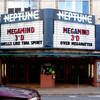"Rainy season" by shutterbug zenobia_joy
I don't know, but I'd like to. To me, The McGuire tear-down is not most interesting from a "smoking-gun" point-of-view--though I'm certainly as curious as anyone else how it turns out--but as a worst-case scenario that asks us to reconsider the sheer volume of water-damaged condominium buildings in Seattle.
Up to this point, multi-thousand-dollar assessments for water-damage related issues were a "headache" or a "nightmare," but confined, on a building-by-building basis, to whomever lived in a problem structure. Leaking windows, especially, are a common but not at all new cause of legal suits flying between residents, developers, and contractors.
Now The McGuire has redefined "nightmare" for everyone, and even the city is scrambling to determine if any more debacles like that are lurking in DPD files. That response is all to the good, but the hard truth is that it rains a good deal in Seattle--maybe not a lot, but often. It rains during construction, it rains after the grand opening, it rains the life of the building.
When you search on Seattle condos and water damage, you'll find an enormous amount of "buyer beware" stories, full of hard-luck tips. It's hard to escape the feeling that if Seattle condos were a car, they'd have been recalled by now. With that in mind, I emailed Seattle's Department of Planning and Development, and asked Alan Justad a few baseline questions:
#1: Per the Seattle Times: "He said the city does not inspect structural components of large buildings directly, but instead relies on a private report from a third-party inspection firm selected by the contractor." What's the thinking behind allowing contractors to pick their own inspectors?
#2: Is the use of a rain screen system solely at the discretion of the architect/contractor? If so, has the city considered implementing guidelines to promote (if not require) use of a system?
#3: Given the area's long-standing history with water damage to condos, can you update me on the DPD's actions in response to the general issue?...
(more)
Bing's Streetside view captures the scaffolded look of The McGuire
Yesterday, the news broke that a 25-story high-rise in Belltown, The McGuire, would be torn down just nine years after construction, due to "defects." The $31-million apartment tower, at 210 Wall Street, had been clad in scaffolding for months, as the owners tried to deal with cracking and spalling of the concrete exterior, due to problems with reinforcement placement in the building’s frame.
Further investigation revealed that post-tensioned slabs--widely used in high-rises to help support and strengthen the concrete, and allow for thinner floors--contained cables that were corroding. (After it opened, The McGuire fairly quickly had troubles with water entering the building's envelope, and then the wrong paint and grout had been used to protect the cables from water, as well.) The City of Seattle Department of Planning and Development told the owners to repair it or vacate by the end of 2010.
Given the costs of repair, the Carpenters Union Local 131 and MEPT, the Multi-Employer Property Trust, gave hundreds of residents notice to vacate. (The McGuire's original developers were the Carpenters Union Local 131 and Harbor Properties.) Ronald Holden, Belltown's eyes and ears, reports on his blog Cornichon that residents are being offered substantial incentives to quit the building by May 15.
Legal advisers Kennedy Associates said the owners were suing the general contractor and architects. Emporis.com and the city's permits confirm that the general contractor on the project was the national firm McCarthy Building Companies, Inc., one of the top ten commercial builders in the U.S. Here is their differentiator:
Because we are true builders, owners get more and better options. Faster and safer execution. And a clear cost/benefit solution that yields the best final cost, every time.
Structural engineers were ABKJ, who also worked on Harbor Steps and Belltown's Arbor Place. Architecture firm Hewitt has a long list of Seattle projects, from Harbor Steps and Belltown's The Klee lofts and suites, to the Capitol Hill light rail station and University Village. Most recently, they are working on Belltown's Third & Cedar project, a 17-story tower with about 200 units, funded by HB Capital....
Most Viewed Stories
- Hie Yourself to Beecher's for Free Mac & Cheese ('til Closing Tonight)
- Mental Illness Drove Capitol Hill's Hatchet Killer
- Tens of Thousands in State May Lose Federal Unemployment Benefits
- McDonald's Adds Insult to Injury with Local Billboard Campaign
- Iron Chefs Galore at CIA's Worlds of Flavor Conference







Most Recent Comments